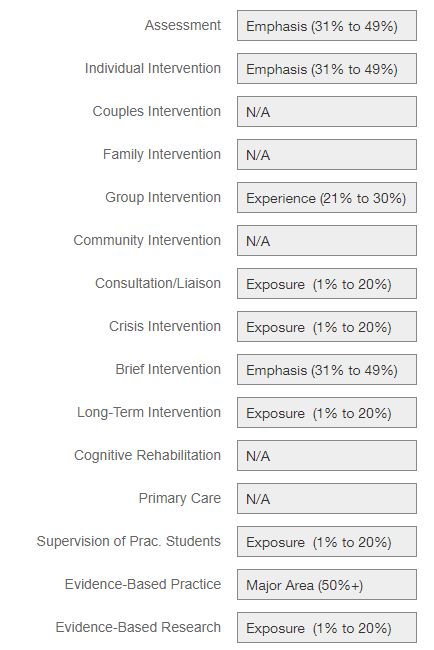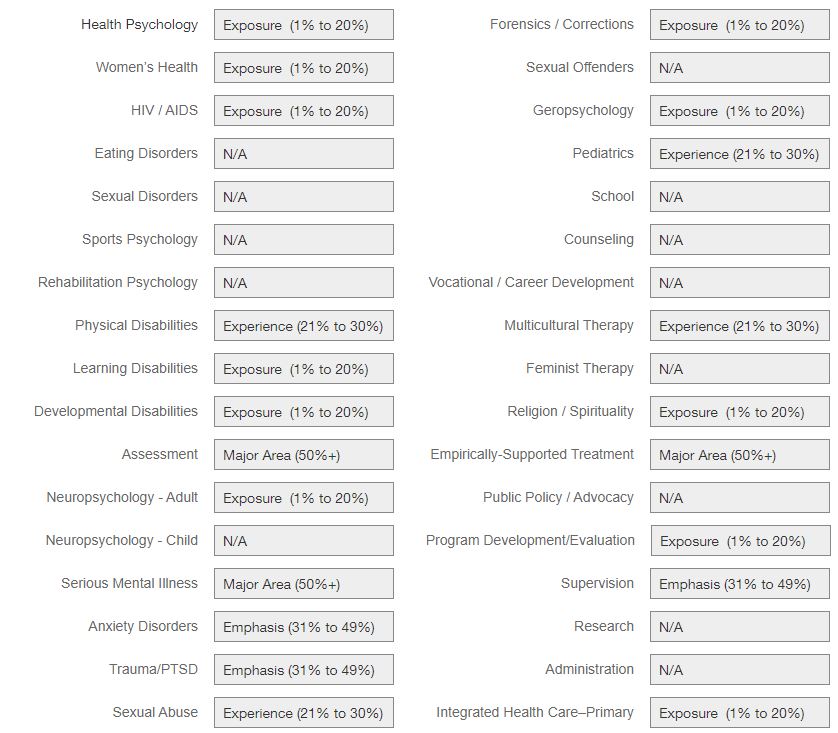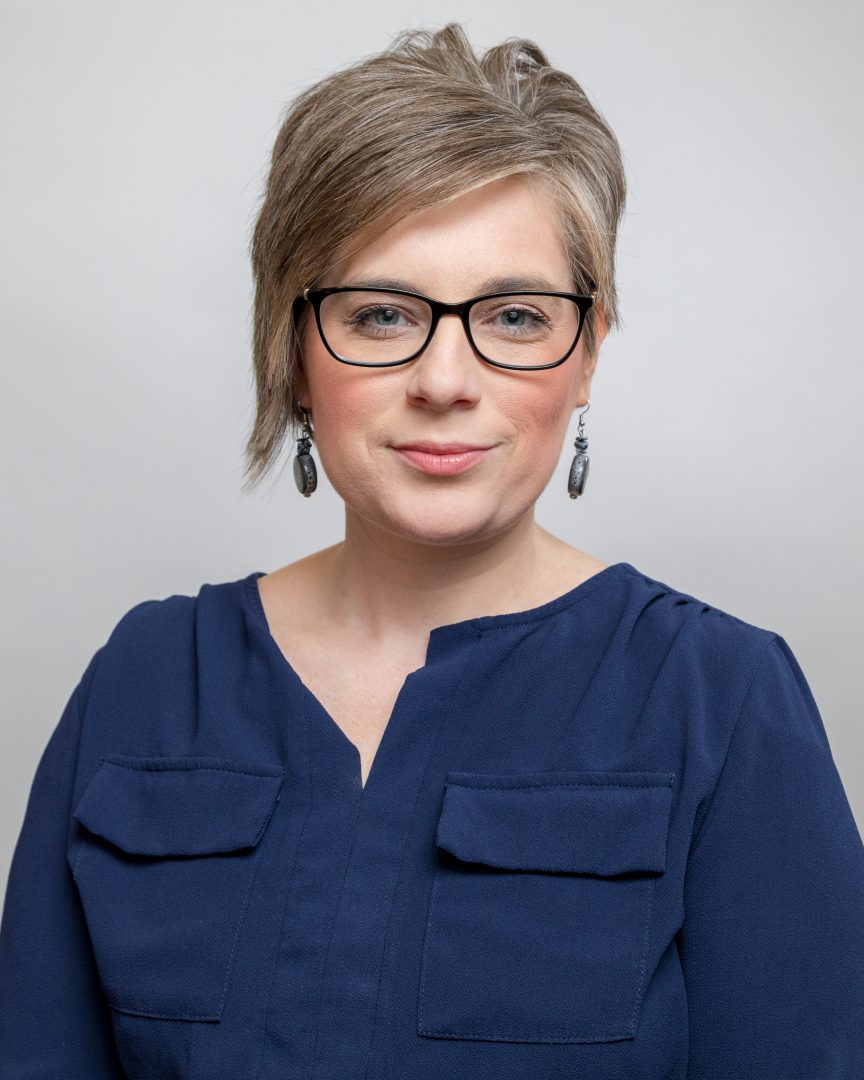
192522 – University Health Combined Track
Internship positions available: 2
Training Opportunities
At University Health Behavioral Health- Combined Track, we offer a unique combined doctoral training experience. Through three rotations, interns will gain experience working with children and adults in outpatient clinic settings, as well as adults 18+ in the acute psychiatric care setting. These three rotations are located within 5-10 minutes of each other in downtown Kansas City.
Interns will be able to gain experience providing individual therapy, group therapy, testing, and collaboration with a multidisciplinary team. Clinical modalities and specific evidenced based treatments vary in each rotation, but generally training opportunities will include provision of individual therapy, group therapy, and psychological assessment. Additionally, interns will provide a range of clinical intervention services and will gain experience with treatment planning, crisis intervention, outcome measurement, and consultation with other professionals.
Inpatient evaluations typically involve a combination of a brief clinical interview and selection of measures that include the MMPI-3, MCMI-IV, WASI-II, BCSE, M-FAST, and TOMM. Outpatient clinics routinely utilize standardized outcome measures and some outpatient testing opportunities might be available at times.
Interns will also participate in group supervision through the interdisciplinary treatment teams on the inpatient units along with an additional hour with a third licensed psychologist at one of the outpatient settings.
Rotation Schedule
Interns typically work a Monday – Friday schedule from 8:00 to 5:00 pm. No weekend work, on-call, or holiday work is required. Typical inpatient workdays will include attending multidisciplinary treatment team meetings, gathering patient outcome data, providing group therapy, providing brief individual therapy, and completing psychological assessments. Outpatient workdays will generally include supervision, providing individual therapy, and providing group therapy when available. Each week will include multiple hours of group supervision in some form, a minimum of two hours of individual supervision, and a minimum of two hours of journal review.
Interns have a dedicated inpatient workstation which includes a shared phone-line, individual computer, and a large window with a view of one of the building’s many courtyards. The Psychology Department maintains various tests utilized in an acute mental health setting, which are generally maintained in the interns’ training office, where interns can read the manuals, practice with the instruments, and easily access them when needed.
Interns will also have a dedicated office space on their outpatient days to see patients and complete medical record entries. All interns have access to programs such as Microsoft Office, Internet browsers, an electronic records systems provided by Cerner (PowerChart / eCare), online test scoring, and other online training tools. The shared network G: drive can be accessed from all University Health computers and contains group curriculum materials, individual interventions, report templates, multicultural articles, and other educational resources on various relevant topics. Each intern also has a personal H: Drive they can use for online storage.
Placement Locations
The traditional track for University Health Behavioral Health System is comprised of the following locations:
- University Health Behavioral Health Acute Care: The inpatient unit is located downtown and housed inside the building for the Center for Behavioral Medicine, where UH operates two 25-bed inpatient units.
- University Health Behavioral Health- Crossroads: This outpatient center provides mental health services to citizens in the downtown Kansas City Crossroads neighborhood. It provides a broad range of clinical services for children, adolescents, and adults.
- Lakewood Counseling Service: This outpatient center opened in 2006 to provide mental health and substance abuse services to citizens of Eastern Jackson County. It provides a broad range of clinical services for children, adolescents, and adults.
It should be noted that the University Health office locations are approximately 2 – 2.5 hours away from quarterly in-person didactic training (including orientation) in Springfield, Columbia, and Jefferson City, Missouri. Due to the distance, interns at this location will be provided with some travel reimbursement considerations for any required training to these events.
Select “University Health – Traditional Track” in the map filter below to show only the locations specific to this track.
| Title | Address | Description | Link |
|---|
APPIC Training Experiences
Treatment Modalities
Example treatment modalities (as listed by APPIC):

Supervised Experiences

Patient Populations

University Health is the largest and most comprehensive health safety-net provider serving Jackson County and Kansas City, Missouri. The service area comprises the urban core of Kansas City, along with the suburban and rural communities that surround the Kansas City metro area.
University Health serves a number of special populations which include those with low socioeconomic status, individuals who are unhoused, incarcerated individuals, and overall populations at-risk due to social and economic disadvantage.
The racial composition of University Health Sciences District service area includes two primary categories: White and African American. These two categories comprise 90.06% of the customers within the Health Sciences District area. Racially, the University Health Sciences District service area reflects the greater Jackson County, Missouri racial mix, with 67.31% White, 22.75% African American, 8.95% Hispanic, 2.06 % Asian, 0.46% Native American/Alaskan Native, 0.29% Native Hawaiian/Pacific Islander, 4.0% reporting some other race, and 3.13% reporting multiple races. The socio-economic data reflects the University Health Sciences District service area has a large number of people in poverty status.
University Health strives to maintain a diverse workforce. University Health strives to set a community example through taking a leadership role in diversity and inclusion, which includes partnering with other organizations in supporting the Trans Health Inclusion conference and other educational and networking opportunities. UH has developed both a Leader’s Diversity and Inclusion Council as well as an Executive Diversity and Inclusion council. There is both a behavioral health and corporate diversity committee, and University Health hospitals account for two of the 14 Missouri locations that have obtained the LGBTQ Healthcare Equality Index Leader designation.

Our Supervisors
Site Training Director

Ashlee Jones, Psy.D.
Dr. Jones works primarily with children, adolescents, and families as an outpatient psychologist at University Health, Crossroads Counseling in Kansas City, Missouri where she provides evidence-based treatments. She is a licensed psychologist and health service provider in the state of Missouri. She has extensive experience providing individual therapy, family therapy and psychological assessment. She provides psychological testing specifically with diagnostic clarification for Autism Spectrum Disorder. She has participated in ECHO Autism, ECHO Autism Center Engagement and ECHO Rubi. She has extensive experience providing didactic presentations on Autism, therapy with children, and psychological testing. Furthermore, Dr. Jones has provided supervision of masters-level and doctoral-level interns. She is a member of the American Psychological Association, APA Division 53 (Society of Clinical Child and Adolescent Psychology) and APA Division 12 (Society of Clinical Psychology).
Primary Supervisors
 Eric Shult, Ph.D.
Eric Shult, Ph.D.
Dr. Eric Shult received his doctorate in counseling psychology at the University of Memphis and his undergraduate degree from Humboldt State University. He is a licensed psychologist in the state of Missouri. After completing his postdoctoral residency at University Health in 2013, Dr. Shut became a psychologist at University Health Inpatient Units. He has extensive experience treating chronic mood, anxiety, and personality issues in both outpatient and inpatient settings. He has extensive experience providing didactic presentations on multiculturalism and suicide prevention and is an adjunct instructor at Avila University in Kansas City, Missouri. Furthermore, Dr. Shult has extensive experience training and providing supervision of masters-level and doctoral-level interns.
 Jennifer Keller, Psy.D.
Jennifer Keller, Psy.D.
Dr. Keller obtained training in various settings, including inpatient psychiatric hospital, community mental health center, university counseling center, learning diagnostic clinic, multicultural center, and hospice. She works primarily with children and adolescents, though she provides some specific services for the adult population. Dr. Keller was previously employed at the University of Tennessee Martin both as a staff psychologist and later as the clinical coordinator of counseling services. Dr. Keller was also formerly the preadolescent program director at Royal Oaks Hospital, where she provided and supervised clinical services on the preadolescent unit. Dr. Keller was previously an adjunct professor at Forest Institute of Professional Psychology and Missouri Valley College, and she is currently an adjunct professor at Avila University. Dr. Keller is the Section Chief for Psychology at University Health and an outpatient psychologist at UH Lakewood Counseling Service in Lee’s Summit, Missouri where she provides evidence based treatments. She is a licensed psychologist and health service provider in the state of Missouri. She has retired her license in Tennessee. Dr. Keller is a registrant with the National Register of Health Service Providers in Psychology. She is a member of the American Psychological Association, APA Division 53 (Society of Clinical Child and Adolescent Psychology), APA Division 12 (Society of Clinical Psychology), and the Missouri Psychological Association. Dr. Keller currently sits on the board for the Greater Kansas City Psychological Association.
 Abbey Gripka, Ph.D.
Abbey Gripka, Ph.D.
Dr. Gripka is a Missouri and Kansas licensed psychologist at University Health Crossroads Counseling in Kansas City, Missouri. She is the primary supervising psychologist for the adult outpatient internship rotation. She completed her doctoral training at The University of Kansas in counseling psychology. Dr. Gripka has extensive training and expertise in assessment and treatment of PTSD and trauma-related concerns, having completed internship and post-doctoral training with emphasis on PTSD and trauma. Dr. Gripka currently provides outpatient individual and group psychotherapy for treatment of various mental health diagnoses, with emphasis on trauma-informed and evidence-based interventions. Additionally, through The University of Missouri-Kansas City (UMKC) Athletics Department, Dr. Gripka provides consultative services to coaches and mental health treatment to student athletes. She supervises several masters and doctoral level practicum students, and also teaches a course of Cognitive-Behavioral Therapy with adjunct in-session supervision to Psychiatry Residents at University Health.
Life in Kansas City, MO
The Kansas City metropolitan area offers a wide range of activities and attractions to ensure there are plenty of ways to unwind during time away from training.
Sports
Kansas City offers multiple professional and semi-professional sporting events throughout the year, including baseball, ice hockey, football, soccer, college basketball, and auto racing. Be here to watch the 2015 World Series Champions in action.
Museums and the Arts
Kansas City has a variety of activities related to music, the performing arts, and visual art, including the Kauffman Center for the Performing Arts, the 18th and Vine Jazz District, Crossroads Art District, Negro Leagues Baseball Museum, WWI Museum at Liberty Memorial, Nelson-Atkins Museum of Art, and multiple indoor and outdoor concert centers.
Shopping and Entertainment
The Kansas City area provides several excellent shopping locations, including the Country Club Plaza and Legends Outlets. It also offers a variety of nightlife options, including the Power & Light District, Westport District, and multiple casinos. There are also multiple locations for family fun, including amusement and water parks, the Kansas City Zoo, LEGOLAND Discovery Center, and the Kansas City Sea Life Aquarium.